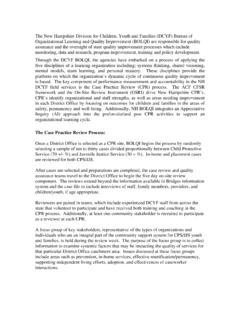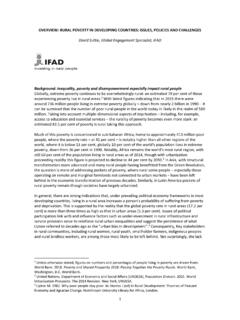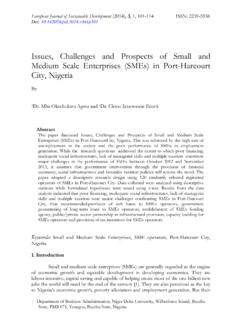Transcription of Challenges and Opportunities for Improving Mental Health ...
1 Maine rural Health Research Center Working Paper #50 Challenges and Opportunities for Improving Mental Health Services in rural Long-Term Care June 2013 Authors Jean A. Talbot, PhD, MPH Andrew F. Coburn, PhD Cutler Institute for Health and Social Policy Muskie School of Public Service University of Southern Maine Challenges and Opportunities for Improving Mental Health Services in rural Long-Term Care June 2013 Jean A. Talbot, PhD, MPH Andrew F. Coburn, PhD Working Paper #50 Maine rural Health Research Center Cutler Institute for Health and Social Policy Muskie School of Public Service University of Southern Maine This study was funded under a Cooperative Agreement with the federal Office of rural Health Policy, Health Resources and Services Administration, DHHS (CA#U1 CRH03716).
2 The conclusions and opinions expressed in the paper are the authors' and no endorsement by the University of Southern Maine or the sponsor is intended or should be inferred. TABLE OF CONTENTS INTRODUCTION .. 1 BACKGROUND .. 2 Population of Interest .. 2 Mental Health Needs and Services in Long-Term Care .. 2 Rationale for Reform .. 4 BARRIERS TO THE PROVISION OF Mental Health SERVICES IN rural LONG-TERM CARE .. 5 Limited Financial Resources .. 5 Workforce Limitations .. 7 Physical Access Barriers .. 8 PROSPECTS FOR Improving Mental Health SERVICES IN rural LONG-TERM CARE.
3 9 Strengthening the rural Mental Health Workforce .. 10 Overcoming Geographic and Physical Access Barriers .. 13 Integrated Care for rural Long-Term Care Recipients in the 15 POLICY CONSIDERATIONS .. 19 LIST OF ACRONYMS .. 21 REFERENCES .. 22 APPENDIX: Provisions of The Affordable Care Act (ACA) With Potential Relevance to Improvement of Mental Health Services in rural Long-Term Care .. 31 LIST OF RECENT WORKING PAPERS .. 32 Maine rural Health Research Center 1 INTRODUCTION Over 10 million Americans with chronic disabilities require long-term services to assist them with activities of daily Mental Health comorbidities are common among members of the United States long-term care Inadequately treated, these conditions can become debilitating and ,5,6 Yet our long-term care system often fails to deliver necessary Mental Health care to those it serves,2,7.
4 8 especially in rural Evidence indicates that improved Mental Health services in rural long-term care could improve outcomes and reduce the costs of care,12,13 but rural provider organizations have historically lacked the resources and capacity to establish the necessary Mental Health infrastructure and services to care adequately for the long-term care However, strong pressures for Health care delivery system innovation combined with new funding Opportunities under the Affordable Care Act (ACA)14 have created new Opportunities for expanding access to appropriate Mental Health interventions for rural long-term care populations.
5 This paper explores novel practices that hold promise for increasing the quality, quantity, and accessibility of Mental Health services in rural long-term care. First, we provide context for this discussion by defining our population of interest, characterizing the Mental Health needs of individuals within this population, describing the psychiatric services typically afforded to them, and delineating potential benefits of enhancing those services. We also discuss why the present policy climate may favor efforts toward reform in Mental Health and long-term care.
6 Next, we focus on conditions that limit the provision of high-quality psychiatric services to rural long-term care recipients. Further, we explore new approaches that have been proposed or used as means of addressing these obstacles. As part of this examination, we consider the potential for synergies between these innovations and reforms promulgated under the ACA. We conclude 2 Muskie School of Public Service with a discussion of the policy implications for advancing new Mental Health service models in rural long-term care.
7 BACKGROUND Population of Interest When we discuss the long-term care population in this paper, we refer to adults who suffer from chronic, disabling conditions, and who need long-term services to manage these conditions and any functional impairment resulting from them. Required services could include varying combinations of medical care, skilled nursing, home Health care, assistance with activities of daily living, homemaker services, and psychosocial supports. Within the overall long-term care population, we focus on rural elders who reside either in nursing facilities or in their own homes in the community.
8 Due to the dearth of relevant data on non-elderly long-term care recipients and those who live in settings such as assisted living facilities and residential care, we omit discussion of Mental Health needs among these subpopulations. It should be noted, however, that many of the workforce development and delivery system innovations reviewed here could be adapted for long-term care recipients in a broad range of living situations. Mental Health Needs and Services in Long-Term Care Psychiatric disorders are widespread in the United States long-term care population.
9 Most adults in nursing homes have some clinically significant psychiatric or behavioral problem, with estimates of prevalence ranging from 65 per cent to 91 per Among long-term care recipients in the community, reported rates of psychiatric morbidity exceed 40 per ,4 The limited available data indicate that depression is the most common Mental Health condition among both nursing home residents15 and community-dwelling long-term care We know of no current studies comparing rural and urban long-term care populations with respect to Maine rural Health Research Center 3 their rates of Mental Health disorders.
10 However, national epidemiological data show that most psychiatric diagnoses occur at similar rates across rural and urban ,17 This overall finding offers some justification for surmising that the prevalence of Mental Health problems among rural long-term care recipients is at least on a par with rates observed in long-term care settings throughout the country. Despite their high levels of need, individuals in the long-term care system often fail to receive appropriate Mental Health services. Deficiencies exist in both quantity and quality.













